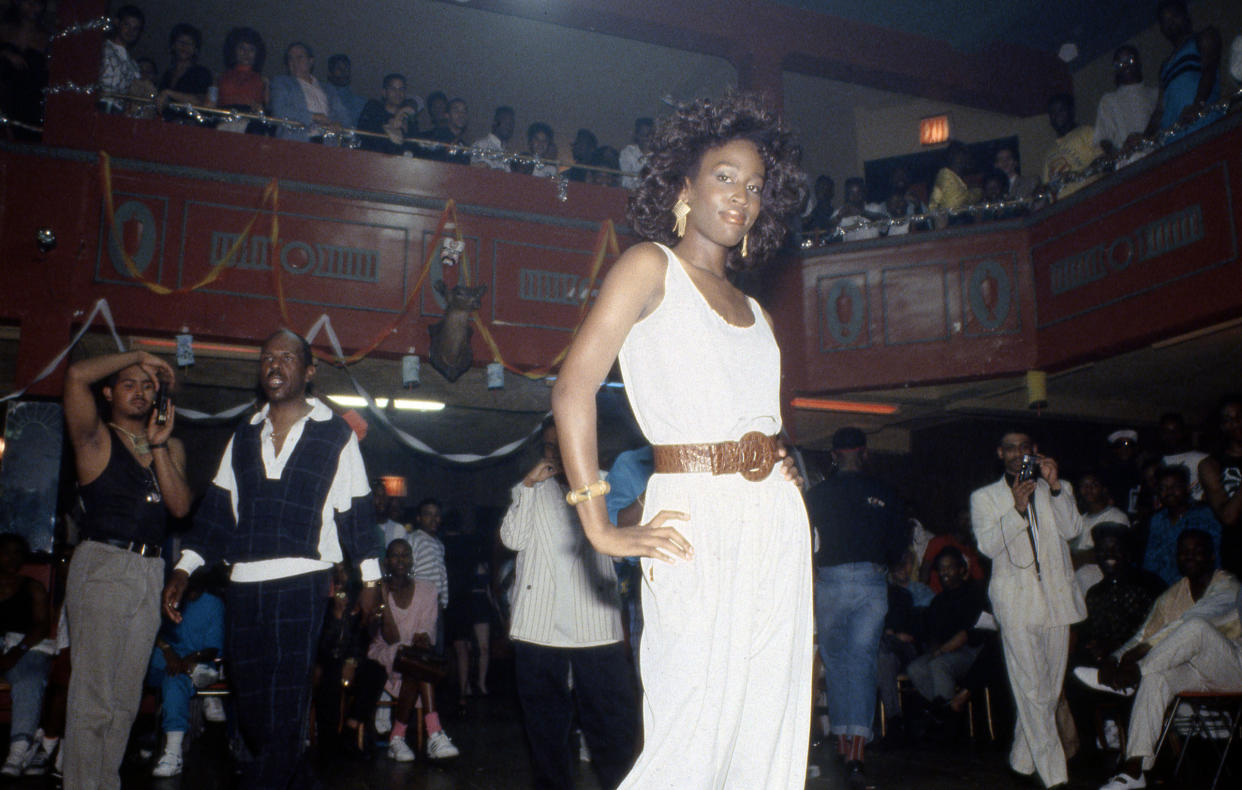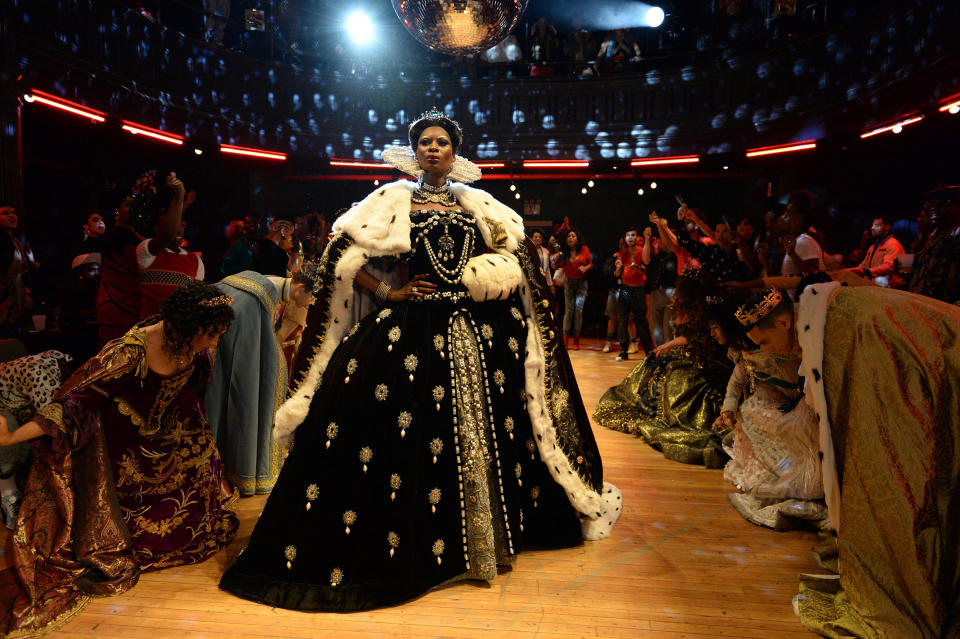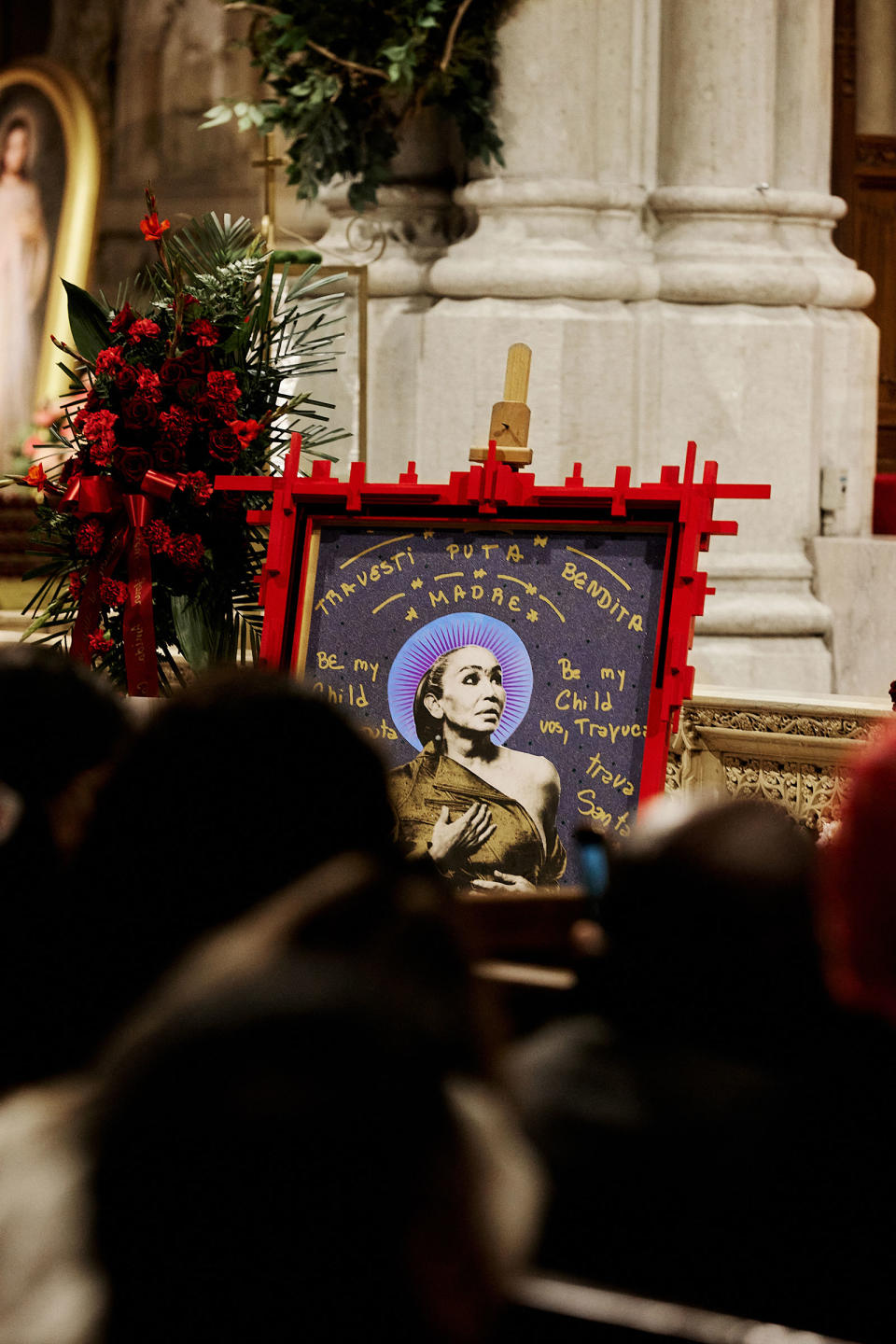How A Term with Queer Origins Became an Internet Sensation

A ball in 1988 in New York City. Credit - Catherine McGann—Getty Images
Mary. Madonna. Matriarch. Mamá. Mother. It's an endearing term colloquially used to refer to a female figure who brings forth new life. But the word—which has been adopted by Gen Z and others who are up-to-date with internet jargon—is also a slang term that has been bestowed upon the biggest names in show business, be it Ariana Grande, Beyoncé, or Zendaya.
The term mother (or at least, in its online vernacular) derives from New York City’s Black and Latino ballroom scene. Social media users often use the word as a synonym for icon and legend—though those titles themselves hold a different status in ball culture. The ballroom house system follows a kinship structure, where trans women, trans and queer men and drag artists become mothers and fathers, creating their own families or ‘houses.’ Many credit Crystal LaBeija, a Black, transgender woman and drag queen who was angered by the colorism and racism affecting drag pageants in the late ‘60s, as the creator of the first ballroom house. “You have mothers, gay mothers, gay fathers, gay siblings, gay uncles, etc. There are actual lineages that you can track and these are in lieu of biological families who have often disowned kids,” says Ricky Tucker, author of the book And The Category Is…: Inside New York's Vogue, House, And Ballroom Community.
It's difficult to put an exact date on when the term mother came to fruition within the community. Part of that is because ball culture has historically been under-documented and strongly relies on oral histories, according to Tucker. Drag balls themselves predate World War I, with one of the first balls hosted in Harlem’s Hamilton Lodge in 1869, per the National Museum of American History’s Behring Center. Tucker personally first heard the word in reference to activist and drag queen Flawless Sabrina, the subject of the 1968 documentary The Queen, who he describes as the “mother hen of New York drag pageants.”
Today, many can thank FX’s Pose and RuPaul’s Drag Race for the word’s thrust into the limelight, the latter of which has become a cult phenomenon: generating 16 seasons (with its highest-rated premiere this year) and inspiring a plethora of spin-offs and international adaptations. “We've got everyone's straight boyfriend with their girlfriend watching, so these words come into popular vernacular,” says Tucker. Mother—including other iterations like motha and muva—has permeated online fan accounts. It's seen under Instagram posts and in tweets on X. It’s the premise of Meghan Trainor’s 2023 tune, “Mother,” which starts with a snippet of a fan saying “that Meghan Trainor is literally mother right now.” But for many in the LGBTQ+ community, the word holds a different significance.

“I love that word, because I really do feel like a mother,” says Iman Le Caire, founder of Trans Asylias, an organization working since 2021 to relocate transgender and nonbinary asylum seekers abroad. Le Caire, a refugee herself, was first called mother when she went to Fire Island Pines, a well-known LGBTQ+ friendly beachfront community tucked some 70 miles away from New York City, while working at her husband’s store.
But the title really became meaningful after Le Caire participated in Black Lives Matter protests and began posting on social media about her efforts. Eventually, her work was noticed by others. “Middle Eastern transgender people connected [with] me on social media, asking, ‘Hey, can you help me,’ ‘Can you please do this?’” Le Caire started as a case manager and Arabic translator for her first client, a Yemeni woman, though the two eventually developed a mother-daughter relationship after talking on the phone everyday.
“The meaning of motherhood to me is to give, to help people, and to focus on providing them with access to a new life, and navigating a new life,” Le Caire says when speaking about the people she’s met through her organization. “They’re my family and I cannot leave them.”
In her own life, Le Caire felt that she was New York City transgender activist Cecilia Gentili’s daughter, who she met through her line of work. “She was an example of survival,” says Le Caire. “She always told me, ‘don't worry,’ ‘do the work,’ ‘you're doing great work, don't give up.’ That's a mother. That's a person that wants you to succeed.”
Rio Sofia, another one of Gentili’s daughters, feels similarly about her mother. Sofia, 31, first met Gentili at a local health clinic. The two connected almost immediately. “She just made herself, very immediately, a supportive figure to me and a maternal figure,” she says. “She had such a unique way of just being able to establish intimacy with people right away and I think that that's why so many people claim [they are] her children.”

Sofia has a strong relationship with her biological mother, but adds that Gentili’s personal experiences as a trans woman made their bond special. “I think that that's real for a lot of trans people. We don't always have the luxury of having biological parents that meet all of our needs.”
Now, Sofia is the mother to a young woman named Flower, who she, in turn, helped transition. “It's such big shoes to fill,” she says. “I feel like within the trans community those sort of lines that divide generations are much, much shorter. I started to be seen as an old soul by the time I was 28 and had transitioned for five years. People also die pretty young in the trans community, so I think that's also a part of it.”
To some, the addition of mother to the internet’s lexicon has detracted from the meaning it bears in the greater LGBTQ+ community and ballroom scene. Tucker says that is part of the natural evolution of words. “The definition of a word is never fixed. Hence, the multiple definitions we have for every word,” he says. But, “even if you think of the actual word mother, that's nothing to be taken lightly. To a lot of people, their mothers—that is their God, especially if they're secular, then that is their creator.”
Others, like Sofia, recognize that the word is being appropriated by those outside of the queer community, but take no issue with the internet’s use of mother. “Language is messy and with how often I see people using mother when talking about women that they idolize, I'm fine with it. I think that it's fun. What I appreciate about it is the reverence for the goddess that we see in people,” she says. Le Caire has a notably more complex relationship with the term because she says she only experienced “conditional love” from her biological mother.
Most people online agree that drag queens like RuPaul are undeniably mother—a subject RuPaul even sang about in the 2023 tune “Call Me Mother.” Sasha Colby, the first trans performer to win a regular season of Drag Race has also been given the title by many, with Daily show correspondent Dulcé Sloan writing that she is Colby’s daughter in her Instagram bio. “There are mothers that we all share,” says Tucker, who mentions that disputes between fans about which artists have earned the title of mother remains a point of conversation. “And then there might be an instance where it's like, okay, that's your mother, not mine.”
Regardless of who is bestowed the title, Tucker calls it “a shame” when words with such important meaning to a particular community become diluted. “Now, I don't think ballroom is going to stop using them. And I think ultimately, the world might just move on…But I think it has its greatest function in the queer community when it comes to the adoption of queer youth who have been displaced, or disowned by their family. That's the real kinship structure. That's the real everyday value of it.”
Contact us at letters@time.com.


